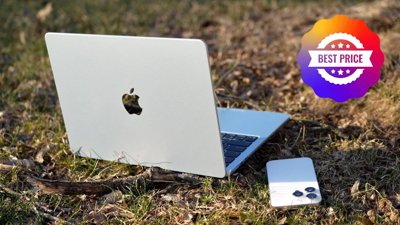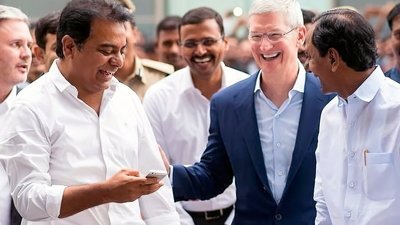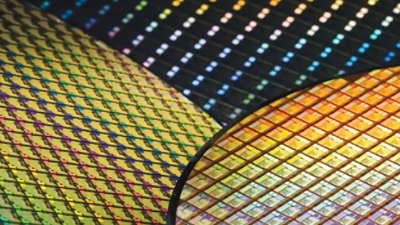HzO was promoting its nano-scale film barrier at CES last week, pitching it as a potential solution to waterproof expensive electronic equipment. One of their demonstrations included submerging an iPhone into water, and having it remain in proper working order.
HzO's technology is similar to the nano-coating process demonstrated at CES by P2i, branded "Aridion" and profiled yesterday. A video demonstration of Aridion-treated paper also appeared in this week's Weekend Tech Review. The technology is already in use by Motorola on both its Droid RAZR smartphone and XYBOARD tablet.
While speaking to attendees at the show, officials with HzO said that Apple is among the companies that have shown interest in the water repelling technology, according to Pocket-lint. Company officials said Apple was interested in making a future iPhone waterproof, potentially with a sixth-generation model expected to be released later this year.
"We expect HzO to be in next season's phones," the company reportedly said.
In addition to Apple, its rival Samsung is also said to have shown interest in HzO's technology. The company said it showed a Samsung executive a waterproofed Galaxy S smartphone, and that company officials were "really excited" by what they saw.
HzO's WaterBlock technology protects the insides of devices on a molecular scale. It has been used in demonstrations to protect a number of Apple products, including the iPhone 4S, iPads and iPods, after the material has been applied to the devices in a vacuum deposition process.
The company says that WaterBlock is a non-toxic, organic material that is safe for people to use. It also doesn't change the aesthetics of a device or add any weight.
The technology is intended for "accidental encounters" with moisture, meaning use in deep waters or being submerged for an extended period of time is not recommended. However, HzO coated devices have reportedly been immersed in water for "many continuous hours," and they continue to work fine.
"The technology is designed to protect against failure due to jumping in a pool and forgetting your phone was in your pocket, or dropping your iPod in the sink while doing dishes, or getting caught in a torrid rain storm and getting soaked, or leaving your smartphone in your pants when they go through the wash," the company said.
 Slash Lane
Slash Lane






-m.jpg)






 Amber Neely
Amber Neely

 Malcolm Owen
Malcolm Owen
 William Gallagher
William Gallagher

 Christine McKee
Christine McKee





-m.jpg)



81 Comments
"The company says that WaterBlock is a non-toxic, organic material ..."
"It also doesn't change the aesthetics of a device or add any weight."HzO, defying the laws of physics since 2012.
HzO, the maker of a "WaterBlock" technology ...
I always think it's funny when an American company uses the "z" in a product name and it's clear that they intend it to be pronounced "ZEE" not realising that the majority of the world actually pronounces this letter as "ZED" making the proposed product name totally silly to say. It's like a classic American blind spot.
Edit: even more hilarious that they chose an announcer with an English accent to say "zee."
It's about time someone made a waterproof phone. Waterproof watches have been around for ages. All it takes is a little rubber gasket.
I'm really thinking the iPhone 5 (aka iPhone 4G) is going to be a show stopper. It was the last thing Jobs worked on before he died. I'm thinking an oval capacitive touch home screen button. With simplistic gestures: swipe to go back, forward, double tap (not push) to zoom.
This will allow users to keep their thumb over the home button more often. Over the screen less often and probably allow for the justification of a larger screen, as more action will be on the home button and not on the screen.
Thoughts?
This is one of those things that needs to be tested well for a company with as much mindshare as Apple and their iDevices. They say it's organic and non-toxic. Great! But organic compounds can still be dangerous even if they aren't poisonous. Have they tested it for carcinogens? Imagine what would happen to Apple's stock if one day Hz0 was linked to cancer and they were selling hundreds of millions of devices a year with it. It's like with the signal attenuation of the iPhone 4 or the CarrierIQ issue. The first one they had to do a press release to control the silly media frenzy it caused and the second they had a very small association with no evidence of keylogging that was the root of the issue with CarrierIQ from a particular carrier and handset vendor.
"The company says that WaterBlock is a non-toxic, organic material ..."
"It also doesn't change the aesthetics of a device or add any weight."HzO, defying the laws of physics since 2012.
They don't mean it that way. The weight gain is so minute that you are unlikely to have have instrument that could measure it and it's impossible to personally notice.
I always think it's funny when an American company uses the "z" in a product name and it's clear that they intend it to be pronounced "ZEE" not realising that the majority of the world actually pronounces this letter as "ZED" making the proposed product name totally silly to say. It's like a classic American blind spot.
Edit: even more hilarious that they chose an announcer with an English accent to say "zee."
Does most of the world say zed? The British certainly do but most English speakers in the world I know are heavily influenced by American culture. Anecdotally, overall I've noticed American spelling and pronunciation of English words in other countries more than I have the British spelling and pronunciations.